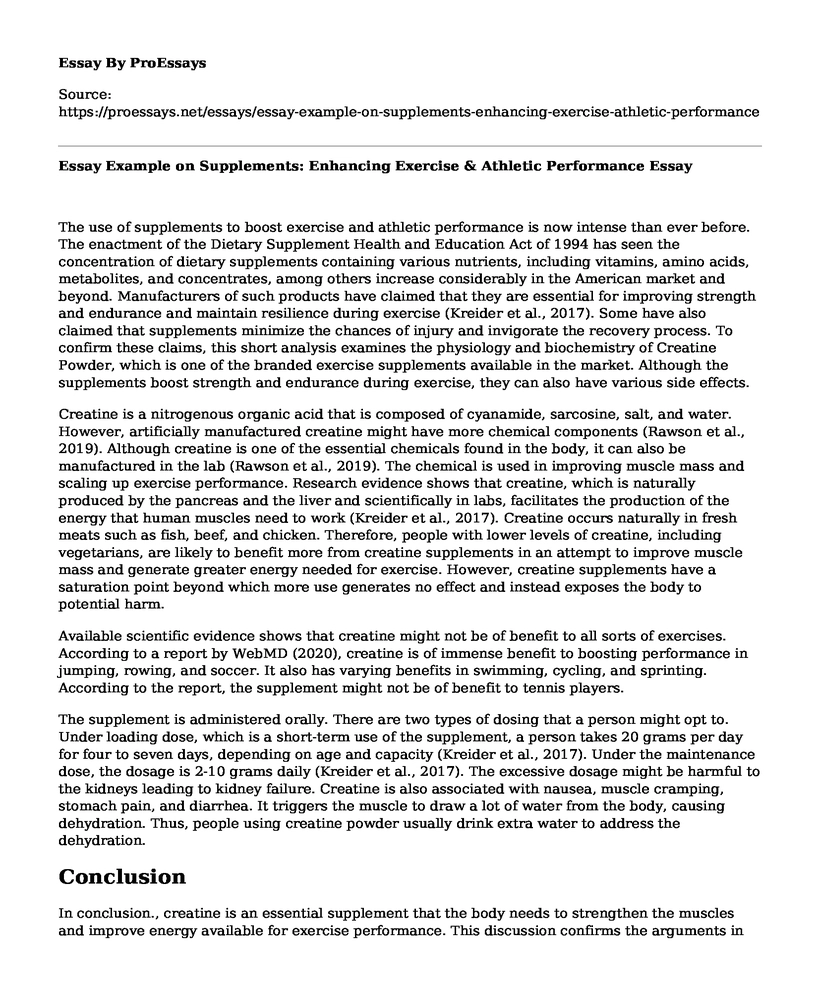The use of supplements to boost exercise and athletic performance is now intense than ever before. The enactment of the Dietary Supplement Health and Education Act of 1994 has seen the concentration of dietary supplements containing various nutrients, including vitamins, amino acids, metabolites, and concentrates, among others increase considerably in the American market and beyond. Manufacturers of such products have claimed that they are essential for improving strength and endurance and maintain resilience during exercise (Kreider et al., 2017). Some have also claimed that supplements minimize the chances of injury and invigorate the recovery process. To confirm these claims, this short analysis examines the physiology and biochemistry of Creatine Powder, which is one of the branded exercise supplements available in the market. Although the supplements boost strength and endurance during exercise, they can also have various side effects.
Creatine is a nitrogenous organic acid that is composed of cyanamide, sarcosine, salt, and water. However, artificially manufactured creatine might have more chemical components (Rawson et al., 2019). Although creatine is one of the essential chemicals found in the body, it can also be manufactured in the lab (Rawson et al., 2019). The chemical is used in improving muscle mass and scaling up exercise performance. Research evidence shows that creatine, which is naturally produced by the pancreas and the liver and scientifically in labs, facilitates the production of the energy that human muscles need to work (Kreider et al., 2017). Creatine occurs naturally in fresh meats such as fish, beef, and chicken. Therefore, people with lower levels of creatine, including vegetarians, are likely to benefit more from creatine supplements in an attempt to improve muscle mass and generate greater energy needed for exercise. However, creatine supplements have a saturation point beyond which more use generates no effect and instead exposes the body to potential harm.
Available scientific evidence shows that creatine might not be of benefit to all sorts of exercises. According to a report by WebMD (2020), creatine is of immense benefit to boosting performance in jumping, rowing, and soccer. It also has varying benefits in swimming, cycling, and sprinting. According to the report, the supplement might not be of benefit to tennis players.
The supplement is administered orally. There are two types of dosing that a person might opt to. Under loading dose, which is a short-term use of the supplement, a person takes 20 grams per day for four to seven days, depending on age and capacity (Kreider et al., 2017). Under the maintenance dose, the dosage is 2-10 grams daily (Kreider et al., 2017). The excessive dosage might be harmful to the kidneys leading to kidney failure. Creatine is also associated with nausea, muscle cramping, stomach pain, and diarrhea. It triggers the muscle to draw a lot of water from the body, causing dehydration. Thus, people using creatine powder usually drink extra water to address the dehydration.
Conclusion
In conclusion., creatine is an essential supplement that the body needs to strengthen the muscles and improve energy available for exercise performance. This discussion confirms the arguments in the market that creatine powder scales up strength and endurance during exercise. However, the optimum benefit of the supplement is achieved when used appropriately. While vegetarians are more encouraged to use these supplements, people who eat fresh meat as part of their regular diet might not need these supplements since their bodies already have sufficient creatine. Excessive concentration of creatine in the body has adverse impacts on the kidney, among other side effects.
References
Kreider, R. B., Kalman, D. S., Antonio, J., Ziegenfuss, T. N., Wildman, R., Collins, R., Candow, D. G., Kleiner, S. M., Almada, A. L., & Lopez, H. L. (2017). International Society of Sports Nutrition position stand: Safety and efficacy of creatine supplementation in exercise, sport, and medicine. Journal of the International Society of Sports Nutrition, 14(1). https://doi.org/10.1186/s12970-017-0173-z
Rawson, E. S., Dolan, E., Saunders, B., Williams, M. E., & Gualano, B. (2019). Creatine supplementation in sport, exercise, and health. Dietary Supplementation in Sport and Exercise, 141-164. https://doi.org/10.4324/9780429465567-7
WebMD. (2020). Creatine: Uses, side effects, interactions, dosage, and warning. WebMD - Better information. Better health. https://www.webmd.com/vitamins/ai/ingredientmono-873/creatine
Cite this page
Essay Example on Supplements: Enhancing Exercise & Athletic Performance. (2023, May 23). Retrieved from https://proessays.net/essays/essay-example-on-supplements-enhancing-exercise-athletic-performance
If you are the original author of this essay and no longer wish to have it published on the ProEssays website, please click below to request its removal:
- The Relationship Between Executive Functions and Lack of Sleep Essay
- Critical Incident in Social Work Essay Example
- Essay Example on Asthma: Airway Inflammation, Swelling, and Difficulty Breathing
- Article Analysis Essay on How Coronavirus Impacts the Global Supply Chain
- Essay on Efficacy of North American Ginseng in Preventing URTIs: A Randomized Trial
- Paper Example on Nursing Managers: Essential Members of the Nursing Fraternity
- Paper Example: International Disaster Risk Factors







